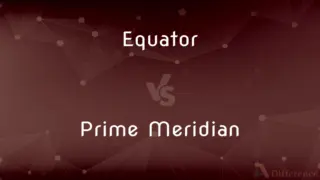Constructive Criticism vs. Destructive Criticism — What's the Difference?
Edited by Tayyaba Rehman — By Fiza Rafique — Published on December 8, 2023
Constructive Criticism provides feedback for improvement, while Destructive Criticism demeans without offering solutions.

Difference Between Constructive Criticism and Destructive Criticism
Table of Contents
ADVERTISEMENT
Key Differences
Constructive Criticism aims to help the recipient grow by highlighting areas that need improvement, coupled with suggestions or solutions. Destructive Criticism, on the other hand, tears down the recipient without offering any clear path toward betterment or growth.
When given Constructive Criticism, individuals often feel empowered to change or adapt because they're presented with actionable advice. In contrast, Destructive Criticism frequently leaves individuals feeling disheartened, belittled, or unsure of how to proceed.
Constructive Criticism stems from a place of genuine concern and the desire to help. It's characterized by its balanced nature – acknowledging strengths while addressing weaknesses. In contrast, Destructive Criticism often feels more like an attack, focusing solely on negatives without any mention of positives or remedies.
The intent behind Constructive Criticism is vital. It's provided with the goal of fostering understanding and growth. Meanwhile, Destructive Criticism typically has a more malicious intent, seeking to undermine, belittle, or deflate the recipient's confidence.
While both Constructive and Destructive Criticism can bring about feelings of discomfort, the former has the potential to lead to positive change and development, whereas the latter often only results in feelings of inadequacy and discouragement.
ADVERTISEMENT
Comparison Chart
Intent
Aids in personal/professional growth.
Tends to belittle or undermine.
Feedback Approach
Balanced with positives and negatives.
Typically one-sided (negative).
Outcome for the Recipient
Empowerment and improvement.
Demoralization and discouragement.
Typical Emotions Evoked
Motivation to change.
Feelings of inadequacy.
Inclusion of Solutions
Often suggests ways to improve.
Rarely offers solutions.
Compare with Definitions
Constructive Criticism
Encourages growth and development.
Your writing style is unique; focusing on structure might enhance its impact.
Destructive Criticism
Destructive Criticism: Focuses solely on negatives without balance.
Your idea is simply terrible.
Constructive Criticism
Feedback aimed at fostering improvement.
Your report was detailed, but adding visuals might make it more engaging.
Destructive Criticism
Destructive Criticism: Harsh feedback without guidance.
Your report was a mess.
Constructive Criticism
Intends to guide and uplift the recipient.
Your idea has potential; consider refining these aspects for a stronger pitch.
Destructive Criticism
Destructive Criticism: Lacks constructive solutions or remedies.
Your writing doesn't make sense.
Constructive Criticism
Often paired with actionable advice.
Your design is vibrant, but aligning these elements can enhance its symmetry.
Destructive Criticism
Destructive Criticism: Often aims to undermine or belittle.
Nobody would understand your weird presentation style.
Constructive Criticism
Offers a balance of positive and negative insights.
Your presentation was clear, but practicing your delivery could make it even better.
Destructive Criticism
Destructive Criticism: May be rooted in malice or envy.
Your design looks like a child's work.
Common Curiosities
Why is Constructive Criticism considered more beneficial?
Because it offers a clear path toward improvement and boosts the recipient's confidence.
Is Destructive Criticism always intentionally malicious?
Not always, but it often lacks the guidance necessary for improvement.
Can Constructive Criticism include negative feedback?
Yes, but it balances the negative with positive aspects and provides actionable solutions.
What's the primary intent of Constructive Criticism?
Constructive Criticism aims to foster improvement and growth.
How does Destructive Criticism usually make the recipient feel?
Destructive Criticism often makes the recipient feel belittled or inadequate.
Can Destructive Criticism ever be helpful?
It's rarely beneficial as it tends to demoralize, but it might spur some to prove critics wrong.
How should one respond to Constructive Criticism?
With an open mind, gratitude for the feedback, and a willingness to adapt and improve.
How can one differentiate between Constructive and Destructive Criticism?
Constructive often provides solutions and balances positives with negatives, while Destructive mainly highlights flaws without guidance.
Is it okay to ignore Destructive Criticism?
It's essential to assess the validity of all criticism but focus on feedback that offers growth.
Can Constructive Criticism ever be misinterpreted as Destructive?
Yes, especially if not communicated effectively or if the recipient is particularly sensitive.
Should managers avoid giving Constructive Criticism?
No, Constructive Criticism can be vital for employee growth and skill development.
What's the best way to deliver Constructive Criticism?
Clearly, honestly, and kindly, ensuring the feedback is specific and solution-oriented.
Is Destructive Criticism always obvious?
Not necessarily. It might be subtle but is usually characterized by a lack of helpful solutions.
Why do some people default to Destructive Criticism?
Various reasons, including personal insecurities, envy, or a lack of communication skills.
Can one learn to turn Destructive Criticism into something constructive for themselves?
Yes, by focusing on any valid points within the criticism and using them as areas for self-improvement.
Share Your Discovery

Previous Comparison
Siberian Tiger vs. African Elephant
Next Comparison
Equator vs. Prime MeridianAuthor Spotlight
Written by
Fiza RafiqueFiza Rafique is a skilled content writer at AskDifference.com, where she meticulously refines and enhances written pieces. Drawing from her vast editorial expertise, Fiza ensures clarity, accuracy, and precision in every article. Passionate about language, she continually seeks to elevate the quality of content for readers worldwide.
Edited by
Tayyaba RehmanTayyaba Rehman is a distinguished writer, currently serving as a primary contributor to askdifference.com. As a researcher in semantics and etymology, Tayyaba's passion for the complexity of languages and their distinctions has found a perfect home on the platform. Tayyaba delves into the intricacies of language, distinguishing between commonly confused words and phrases, thereby providing clarity for readers worldwide.












































